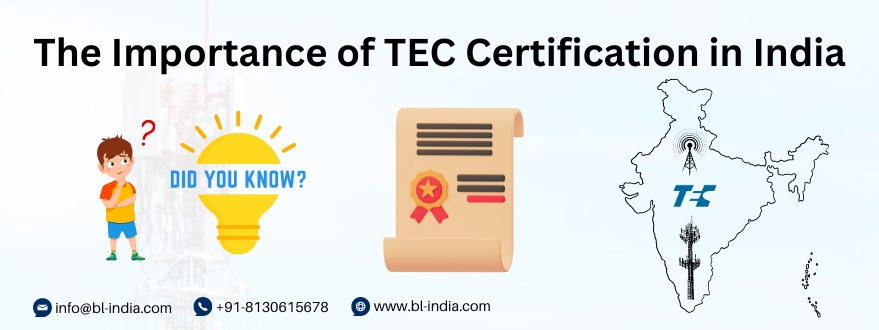
In the ever-evolving industry of telecommunications, where innovation is constant, and technology is rapidly advancing, adherence to quality standards becomes crucial. One such essential certification in the telecom sector is the Telecommunication Engineering Centre (TEC) Certificate.
This certification holds immense significance and plays a crucial role in ensuring the reliability, interoperability, and quality of telecom products and services. It is a mark of approval from the Government of India, assuring consumers that their telecom equipment and services meet strict technical standards and regulatory requirements.
Let's delve deeper into the significance of TEC Certification and its pivotal role in ensuring the seamless functioning of telecom products.
The Telecommunication Engineering Centre is a pivotal agency of the Government of India under the Department of Telecommunications (DoT). TEC is responsible for formulating the standards and specifications for telecom equipment and services in India.
TEC Certification is a mandatory requirement for any telecom equipment or service to be deployed in India. This certification ensures that telecom products and services meet the necessary technical standards, specifications, and quality benchmarks set by the government. It covers various telecom equipment, including mobile devices, network infrastructure, Wi-Fi equipment, and more.
TEC certificate is essential for maintaining the integrity and reliability of telecom products in India. It ensures that when consumers use telecom services or devices, they experience seamless connectivity and reliable performance.
This certificate safeguards consumer interests by preventing the proliferation of substandard or counterfeit products in the market. By adhering to TEC standards and obtaining TEC certification, telecom companies demonstrate their commitment to quality and reliability, thereby instilling confidence among consumers and stakeholders.
The TEC Certificate holds immense importance in the Indian telecom industry due to several compelling reasons. It serves as a critical mechanism to ensure the safety of end-users. By subduing the radio frequency emission of telecom equipment, the TEC certification safeguards the well-being of users and the general public.
This aspect is crucial given the widespread use of mobile phones and other wireless devices in everyday life. The TEC certification process entails thorough testing and evaluation to ensure that telecom equipment adheres to safety standards, mitigating potential risks to users.
TEC certificate is significant in maintaining the integrity of communication networks by ensuring that certified equipment does not negatively impact the performance of other devices or services. This interoperability is essential for the seamless functioning of telecom networks and the delivery of reliable services to consumers.
Obtaining TEC certification provides businesses with tangible proof that their telecom products meet the required national and international standards and regulations. This enhances consumer trust and facilitates market access and competitiveness.
TEC certificate serves several crucial roles for telecom products in India:
The key functions of TEC certification include:
The process of obtaining a TEC Certificate in India involves the following steps:
Step 1: Submit an application to the Telecommunication Engineering Centre along with the necessary documents and information regarding the telecom product or service seeking certification.
Step 2: TEC conducts technical evaluation and testing of the product or service to assess its compliance with the relevant standards and specifications.
Step 3: TEC evaluates the test results to determine whether the product or service meets the required technical standards and regulatory requirements.
Step 4: TEC verifies the submitted documents, including technical specifications, test reports, and other relevant documentation. The completeness and accuracy of the documentation are crucial for the certification process.
Step 5: Upon successful completion of the evaluation process and compliance assessment, TEC issues the TEC Certificate to the applicant.
To obtain a TEC Certificate, the following documents are required:
Brand Liaison, a compliance consultancy, provides invaluable assistance and support to manufacturers and importers in obtaining TEC Certificate.
By facilitating the process of obtaining this certification easily and quickly, our team of experts plays a pivotal role in enabling businesses to sell their telecom products in India legally.
As a trusted partner in navigating the certification process, we empower businesses to meet regulatory requirements efficiently, fostering innovation, competition, and consumer protection within the telecom ecosystem.